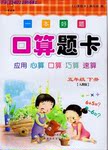题目内容
---You didn’t come to the meeting yesterday afternoon, did you?
---No, I ______ at the station for my uncle from Beijing.
- A.was waiting
- B.have waited
- C.am waiting
- D.will wait
A
考查动词的时态。根据时间状语yesterday afternoon,可知应用过去时态的某种形式,且表示昨天下午一直在做的事,所以用过去进行时。选A。
考查动词的时态。根据时间状语yesterday afternoon,可知应用过去时态的某种形式,且表示昨天下午一直在做的事,所以用过去进行时。选A。

练习册系列答案
 一本好题口算题卡系列答案
一本好题口算题卡系列答案
相关题目
What is your favorite colour? Do you like yellow, orange, red? If you do, you must be an optimist (乐观者), a leader or an active person who enjoys life, people and excitement. Do you prefer grey and blue? Then you are probably quiet, shy and you would rather follow than lead. If you love green, you are strong-minded and determined(有决心的). You wish to succeed and want other people to see you are successful. At least this is what psychologists(心理学家)tell us, and they should know, because they have been seriously studying the meaning of colour preference (爱好), and the effect that colours have on human beings(人类).They tell us that we don't choose our favorite colour as we grow up. If you happen to love brown, you did so as soon as you opened your eyes, or at least as soon as you could see clearly.
A yellow room makes us feel more cheerful and comfortable than a dark green one, and a red dress brings warmth and cheer to the saddest winter day. On the other hand, black is depressing(压抑的). Light and bright colours make people not only happier but also more active. It is a fact that factory workers work better, harder, and have fewer accidents when their machines are painted orange rather than black or dark grey .
Remember, then, that if you feel low, you can always brighten your day or your life with a new shirt or a few colourful things. Remember also that you will know your friends and your enemies better when you find out what colours they like and dislike. And don't forget that anyone can guess a lot about your character when you choose a piece of handkerchief or a lampshade(灯罩).
【小题1】According to this passage, ________.
【小题2】If one enjoys life, one is sure to prefer________.
【小题3】The main idea of this passage is ________.
【小题4】The writer believes that in realizing the four modernizations(四个现代化) of our country, we need more people who love ________.
【小题5】“I'm feeling black.” means “________ ”.
A yellow room makes us feel more cheerful and comfortable than a dark green one, and a red dress brings warmth and cheer to the saddest winter day. On the other hand, black is depressing(压抑的). Light and bright colours make people not only happier but also more active. It is a fact that factory workers work better, harder, and have fewer accidents when their machines are painted orange rather than black or dark grey .
Remember, then, that if you feel low, you can always brighten your day or your life with a new shirt or a few colourful things. Remember also that you will know your friends and your enemies better when you find out what colours they like and dislike. And don't forget that anyone can guess a lot about your character when you choose a piece of handkerchief or a lampshade(灯罩).
【小题1】According to this passage, ________.
| A.one can choose his colour preference |
| B.one is born with his colour preference |
| C.one's colour preference is changeable |
| D.one has to choose his favourite colour as he can see clearly |
| A.red to yellow | B.blue to orange |
| C.red to grey | D.blue to yellow |
| A.one's color preference show one's character |
| B.you can brighten your life with wonderful colours |
| C.psychologists have been studying the meaning of colour preference |
| D.one's color preference has something to do with his character and colours have effects on human beings |
| A.yellow | B.red | C.green | D.black |
| A.I am feeling well. | B.I am very happy. |
| C.I am excited. | D.I am depressed |
阅读下面短文,从方框内选择恰当的句子填入短文空白处,使短文内容完整、意思连贯。
Where do our favorite foods come from? The truth may surprise you. Did you know curry isn’t Indian? Did you know Americans weren’t the first to eat hamburgers? Or did you know pizza wasn’t created in Italy?
First, let’s talk about curry. 【小题1】 But in reality(事实), wealthy English people were cooking with curry spices (香料) hundreds of years before British ships traveled to India.
【小题2】 Cooks of wealthy English families created curry dishes, and later these dishes became popular in other parts of England.
【小题3】 The Persians were eating round, flat bread with cheese in the 500s-nearly one thousand years before pizza became popular in Naples, Italy!
Finally let’s look at the truth behind hamburgers. Many people think hamburgers are an American food. 【小题4】 A German named Otto Kuasw made the first hamburger in 1891. Four years later, German sailors introduced hamburgers to Americans.
Where foods come from isn’t nearly as important as how they taste—delicious! 【小题5】
Where do our favorite foods come from? The truth may surprise you. Did you know curry isn’t Indian? Did you know Americans weren’t the first to eat hamburgers? Or did you know pizza wasn’t created in Italy?
First, let’s talk about curry. 【小题1】 But in reality(事实), wealthy English people were cooking with curry spices (香料) hundreds of years before British ships traveled to India.
【小题2】 Cooks of wealthy English families created curry dishes, and later these dishes became popular in other parts of England.
【小题3】 The Persians were eating round, flat bread with cheese in the 500s-nearly one thousand years before pizza became popular in Naples, Italy!
Finally let’s look at the truth behind hamburgers. Many people think hamburgers are an American food. 【小题4】 A German named Otto Kuasw made the first hamburger in 1891. Four years later, German sailors introduced hamburgers to Americans.
Where foods come from isn’t nearly as important as how they taste—delicious! 【小题5】
|